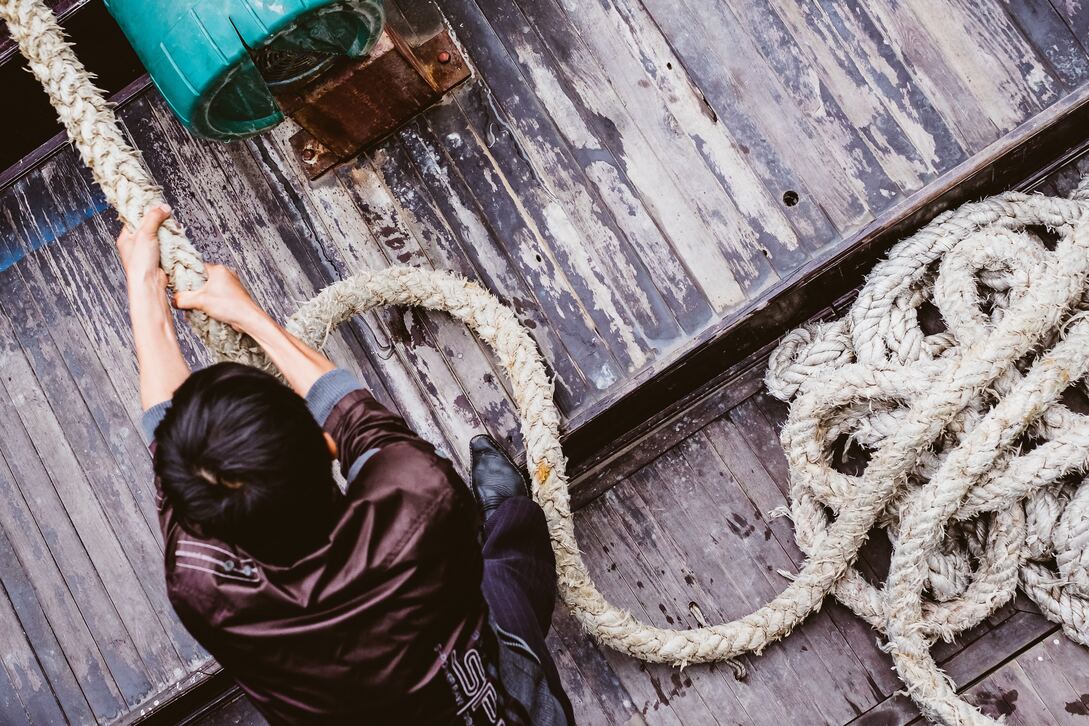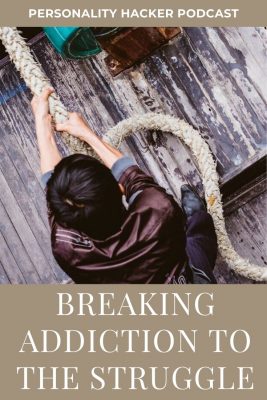Download Episode Here – right click link and select “Save Link As…”
In this episode, Joel and Antonia talk about “the struggle” and how we can overcome our addiction to the control it has over our lives.
In this podcast you’ll find:
- Struggle is our relationship to challenge.
- It is our resistance to a challenge.
- The difference between challenge and struggle is that more resources are required to overcome struggles than challenges.
- When we struggle with something our identity gets wrapped up in it.
- Pain is part of life. You’re always going to have pain.
- Suffering is your response to pain.
- It’s an inability to accept what you’re experiencing.
- Buddha’s concept is to surrender to the pain and not get attached to it.
- Some suffering is elective.
- Some things in life are legitimate struggles.
- Most of us haven’t been able to get to the level of pain tolerance that Buddhist monks can endure.
- There are going to be times when life feels like a struggle.
- Dan’s recent podcast coming close to dying.
- There an addictive quality to struggle and suffering.
- Most of us don’t know what to do when the struggle is removed.
- We become wired in a certain way, and we are always looking for homeostasis.
- We get a temporary feeling of relief once the struggle is gone, but then the brain defaults back to what it is wired to endure.
- You have the wiring for struggle, and so you need to attach that to something else if the initial struggle is removed.
- The world is the best its ever been.
- Problems are being solved.
- What can we do to unhook ourselves from the idea that life has to be a struggle?
- Let people finish thoughts that you find threatening.
- Entertain different viewpoints.
- Religion is good at leveraging this human tendency that struggle gives us meaning.
- Are we disloyal to important causes if we stop struggling?
- We think if we acknowledge that things are good, we will become apathetic and stop making progress.
- Some people conflate gratitude with endorsement.
- Religion teaches us that we need to sacrifice this corporal life in the present for a deferred reward in the future.
- We do it when we’re raising kids too. We don’t live for ourselves. We live for our kids.
- The deferred life program can be done in a multiple of ways.
- Addiction to struggle is another deferred life program, just more secularized.
- The secularized struggle misses out on the grace, mercy, and forgiveness that comes with religion.
- Stop trying to correct everything and just put out the good stuff.
- More demonstration less articulation
- Struggle is a resource hog
- Either go at a challenge directly or go at it bitching and moaning.
- When you hang back from the idea that things have to be a struggle, you can start enjoying life.
- We assign nobility to negative emotions.
- “If you’re not outraged you’re not paying attention.”
- Positivity takes fewer resources.
- If we have negative emotions living within us, we need to process them, but we don’t need to live there.
- Struggle is a noble distraction.
- It’s burning resource for the benefit of your ego.
-
Dave Logan Tribal Leadership
- Level 1: The Universe Sucks – Total negativity. Some people live here but not many
- Level 2: The Universe is okay, but I suck – Eor syndrome. More people live here
- Level 3: I’m awesome; you all suck. The critics live here. This is where the vast majority of people live.
- Level 4: We’re awesome, everyone else sucks. So your group is great, but whoever isn’t in your group sucks.
- Level 5: The universe is awesome. You’re awesome, and I’m awesome.
- Level 5 is where we want to be.
- Level 4 is where corporations strive for because competition sparks camaraderie.
- Struggle gives us a temporary purpose.
- Camaraderie with like-minded individuals.
- Could everybody let go of struggle and hit these challenges more head-on?
- The collective creates too much tribal conflict.
- If you feel you have to struggle until the world gets to the place you want it to be, you are going to stay in perpetual struggle and never experience the life you want.
- The antidote for struggle is gratitude and purpose.
- You can do the things you want to see manifest while still maintaining gratitude and purpose.
- Gratitude = look how far we have come.
- If you can’t see how far we have come, you are intentionally neglecting progress.
- Just because it isn’t your idealized form, you are being wildly inaccurate and not living in reality.
- Gratitude gives us a sense of hope. Things aren’t all doom and gloom.
- Purpose = our dharma picks us; we don’t pick it.
- Surrender to purpose as opposed to shoehorning purpose.
- Purpose doesn’t need to be a struggle.
- Is struggle our synthetic idea of purpose?
- Everybody wants you to be just as outraged as they are.
- Don’t force your dharma on everyone else.
- You aren’t on your dharma if you are trying to force others to see things your way.
- Abandon the struggle and save your resource for your dharma/purpose.
- Say the thing you are struggling for is realized, what comes next?
- Where are you going to channel that fervor?
- What are you trying to accomplish?
- If you are allowing yourself to have an artificial version of purpose, it gets arbitrary real quick.
To subscribe to the podcast, please use the links below:
Subscribe with iTunes
Non-iTunes Link
Soundcloud
Stitcher
Google Play
Spotify
Radio Public
PlayerFM
Listen Notes
If you like the podcast and want to help us out in return, please leave an honest rating and review on iTunes by clicking here. It will help the show and its ranking in iTunes immensely! We would be eternally grateful!
Want to learn more?
Discover Your Personal Genius
We want to hear from you. Leave your comments below…



Share:
Podcast - Episode 0311 - How To Be A Good Critic
Podcast - Episode 0313 - Honoring Personal Thought Leaders
17 comments
A struggle is important, it gives us the necessary incentive to continue to advance under the (possible) threat of our very existence; it allows for adversaries to work together or to negotiate with one another for survival. Our so-called struggle(s), should be defined, prioritized, and focused on advancement, not weaponized or limited by our own making.
The preferred definition “strive to achieve or attain something in the face of difficulty or resistance”, should be taken to heart; a challenge can be shunned, forgotten, never taken, not acknowledged, etc., a struggle cannot, it simply does not just go away, regardless of what we do. That is the difference and the point.
“Everything is great, and nobody’s happy.” – Louis CK
The idea that things have never been better is true in a sense but untrue in the grand scheme of things. People are more lonesome than ever before, we work longer hours for less pay, and over 40% of US citizens say they can’t weather a $500 emergency. We’re being worked to the bone (those of us who can’t or won’t get to the top) and we’re told to down meds and buy a new TV to make ourself feel better. And to what end, so our bosses can post staged vacation pics on social media to compete with other exploiters posting their staged vacation pics on social media? Furthermore, no other animal works more than 4 hours per day on average for their basic needs. Yes we have amazing technology, but we don’t have the basics, such as community, and easy access to food and shelter, unless you join the modern system of work, or trading your best years, practically your life, for a meager meaningless and unfulfilled existence. So yes, everything’s great, and yes, nobody’s happy.
James
P.S. For more in this check out Christopher Ryan’s latest book Civilized to Death.
P.S.S. I love the content both of you put out. Much love!
I think you got the crux of the message, Danielle. Thank you.
A
“Our dharma picks us”. For some reason—well I know the reason—that statement is going to trigger a catharsis in me upon later reflection when I have time to process. And I hope for many others.
It is so difficult to let go of the desire to want to control how we impact the world, but this is exactly what needs to happen to do so in a way that is organic to our gifts and therefore truly powerful. A lot of ouch here, but a lot of necessity.
I think there’s a difference between being concerned for the suffering of others/yourself/your group and letting it consume you. All of the issues you pointed out are valid and need to be addressed.
How I see it, an addiction to a struggle is letting it define your life. You can be concerned about and work towards solving problems, but if it consumes your life it isn’t healthy. I’ve let my own worries and anxieties about the state of the world consume me before, and those were some of the worst times of my life.
About a week ago a friend of mine posted to Facebook something akin to “The world’s ending, why am I bothering with college?” Someone who I don’t know responded, “The world has technically ended countless times over the millennia. We need smart people like you to rebuild after.”
I thought that was an extremely important comment. Disaster happens, civilizations fall, but people can’t let that consume them or they will miss opportunities that can give them the ability reconstruct something new and positive from the metaphorical ashes.
That’s how I essentially view my place in the world as a young woman. If everything goes downhill quickly and the worst happens, I’ll hold onto my cards gathering as much knowledge as possible and hopefully be around to help in the aftermath.
Now this is also coming from a white cisgender individual. But, I see insight as insight. I think Joel and Antonia’s message in this podcast can have a wide application because it doesn’t delve into too many specifics. Specifics are a double-edged sword, they’re great, but can make it seem like you’re against a side, which encourages hostility. Then again, I am super happy to find content like this since I’ve tried to position myself as someone palatable to both sides of the “culture war” here in the US. So, I’m certainly biased.